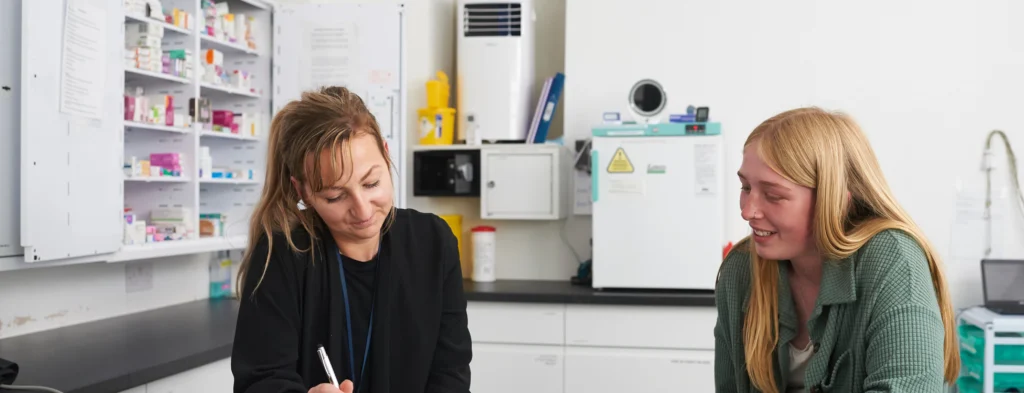Depression Treatment Options | Major Depressive Disorder
If you’re struggling with depression, several treatment options can ease your symptoms and support recovery. Finding the right approach depends on the type and severity of your depression, as well as your personal needs and preferences.
This guide outlines the most effective depression treatment options to help you make informed choices and understand what to expect.
Medical Treatments for Depression
Medical treatment for depression often involves prescription medication or a combination of pharmacologic treatment and psychological therapies. A mental health professional may adjust your treatment plan based on the symptoms of depression, how severe they are, and how well you respond over time.
Antidepressant Medications
Antidepressants are one of the most common depression treatment options for people with depression. These medicines alter brain chemistry, particularly neurotransmitters like serotonin and noradrenaline, which are involved in regulating mood. Common types include SSRIs (e.g., fluoxetine, citalopram, sertraline), SNRIs (e.g., venlafaxine, duloxetine, tricyclics like amitriptyline, and others.
Most people begin with an SSRI, as these generally have fewer side effects and are safer. It usually takes several weeks to notice any improvement. You may need to try different doses or medications before finding the right fit. Antidepressant treatment often continues for six months or longer, even after depressive symptoms improve.
Augmentation Therapies
If a single antidepressant is not enough, your doctor may add another medication to enhance its effect. This is known as augmentation therapy. It might involve another antidepressant, lithium, low-dose antipsychotics, or anti-epileptic drugs.
Augmentation is typically used for treatment-resistant depression or severe major depression. Your healthcare provider will monitor closely for side effects and response. For many patients with major depressive disorder, this combined approach helps to ease depression symptoms more effectively.
Managing Side Effects
Antidepressants can cause side effects, particularly when starting or adjusting a dose. Common side effects include:
- Nausea or digestive discomfort
- Insomnia or excessive drowsiness
- Headaches
- Dry mouth
- Sexual dysfunction
These often subside after a few weeks. However, if side effects persist or worsen, consult your GP. You should never stop taking your medication suddenly, as this can cause antidepressant discontinuation syndrome.
Keeping a symptom and side effect diary may help your doctor optimise your treatment.

Psychological Therapies for Depression
Psychotherapy plays a critical role in the treatment of depression. These evidence-based approaches help address the thought patterns, behaviours, and relationship issues that contribute to your depression. Many people with depression benefit from combining therapy with medication.
Cognitive Behavioural Therapy (CBT)
CBT is a widely recommended psychotherapy for depression. It helps you identify and challenge unhelpful thinking patterns and behaviours. You learn practical strategies to improve your mood, manage stress, and break cycles of negativity.
This structured therapy usually lasts 6 to 20 sessions and has strong evidence for both mild and moderate depression. CBT is often part of initial treatment plans, especially for depression in adults.
Interpersonal Therapy (IPT)
IPT focuses on how personal relationships and life events impact your mental health. It helps improve communication skills, resolve conflicts, and build stronger social support.
Sessions may involve role-play and emotional expression to help you navigate grief, life transitions, or relationship issues. IPT is typically delivered over 12–16 weeks and is especially useful when depression is associated with grief, role transitions, or post-partum depression.
Mindfulness-Based Cognitive Therapy (MBCT)
MBCT combines mindfulness training with cognitive strategies. It helps people with depression become more aware of their thoughts and feelings without reacting automatically. Practising mindfulness techniques like breathing exercises or meditation can reduce relapse risk.
MBCT is effective for those with recurring episodes of depression. It is typically offered in a group format over eight weeks and can also benefit people with anxiety and depression.
Treatment-Resistant Depression
Treatment-resistant depression refers to cases where typical treatments such as antidepressants and psychotherapy do not lead to sufficient improvement. This form of depression may require a tailored treatment plan involving multiple approaches.
Options for treatment-resistant depression include combination medications, brain stimulation therapies like ECT or TMS, and emerging interventions such as psychedelic-assisted therapy.
If you have experienced multiple major depressive episodes or have not responded to the current treatment, consult a mental health professional with expertise in resistant depression. A thorough diagnosis and treatment review can guide the next steps.
Major Depressive Disorder and Addiction: A Complex Relationship
Many people with depression also experience substance use or behavioural addictions. This link is especially strong when you use drugs, alcohol, or compulsive behaviours to manage emotional pain or escape difficult emotions. Depression may contribute to your addiction, and vice versa, leading to a cycle that worsens both conditions.
Effective treatment for co-occurring conditions typically involves integrated care, addressing both the mental health condition and the use disorder at the same time. Cognitive behavioural therapy and tailored pharmacological treatment are often used to treat severe cases.

Lifestyle Modifications and Self-Help Strategies
For many people, small changes in daily life can make a significant difference in managing depressive symptoms. These strategies are particularly helpful when used alongside other treatments.
Exercise and Physical Activity
Exercise helps release brain chemicals like endorphins and serotonin, which naturally improve mood. Even gentle activity, such as walking, can help with depression. Regular movement can also enhance sleep, reduce stress, and increase self-esteem.
Aim for at least 30 minutes of activity most days. Choose something enjoyable, whether dancing, gardening, or cycling, and stick to your treatment plan.
Diet and Nutrition
Your diet plays a role in mental health. Foods high in sugar or processed ingredients may worsen mood and energy levels. Nutrient-dense meals support brain function and emotional balance. Food rich in omega-3 fatty acids may also support mood regulation.
A balanced diet should include:
- Fruits and vegetables (e.g. berries, spinach)
- Whole grains (e.g. oats, brown rice)
- Lean proteins (e.g. fish, legumes)
- Healthy fats (e.g. olive oil, seeds)
Eating regularly stabilises blood sugar, which helps manage mood swings. Healthy eating can support the treatment of mood disorders and improve the symptoms of depression.
Sleep Improvement
Sleep disruptions are common in people with depression, and restoring healthy sleep habits can significantly improve how you feel. To support better rest, try to keep consistent sleep and wake times, avoid caffeine late in the day, and create a quiet, dark sleep environment.
It also helps to unplug from screens at least 30 minutes before bed and practise relaxation techniques such as deep breathing or meditation. If sleep issues persist, consult your doctor. Addressing poor sleep is essential in the effective management of depression.

Advanced and Alternative Depression Treatment Options
When standard treatments do not provide relief, alternative or advanced options may be recommended. These interventions target the brain more directly and are typically reserved for treatment-resistant depression.
Electroconvulsive Therapy (ECT)
ECT is a medical procedure used to treat severe depression and other forms of major depression when other treatments fail. It involves passing a small electrical current through the brain to trigger a brief seizure while the patient is under anaesthesia.
ECT is used to treat severe depression, especially when suicidal thoughts or acute major depression are present. It can be life-saving, though side effects like memory loss or confusion can occur.
Transcranial Magnetic Stimulation (TMS)
TMS is a non-invasive brain stimulation technique that uses magnetic pulses to stimulate areas of the brain involved in mood regulation. It’s often used in treatment-resistant major depression.
TMS sessions last 30–40 minutes and are done while you’re awake. Side effects are usually mild, such as a headache or scalp discomfort. TMS does not require sedation and allows you to return to normal activities immediately.
Psychedelic-Assisted Therapy
This emerging treatment uses substances like ketamine or psilocybin in controlled settings with therapeutic guidance. It may benefit people with depression that has not responded to conventional therapy or medication.
While research is ongoing, psychedelic-assisted therapy shows promise in reducing symptoms quickly. However, it’s not suitable for everyone and should only be pursued under the supervision of trained professionals.
Find a Treatment Tailored to Your Needs at PROMIS
Depression is a common mental health condition, but effective treatment requires more than clinical expertise alone. It also takes a setting where people feel understood, supported, and safe.
PROMIS provides such an environment. Known for their focus on integrated care, we offer therapies for depression, anxiety, and co-occurring addictions, supported by evidence-based approaches.
Whether you are facing chronic depression, anxiety or depression, or a recent diagnosis of major depressive disorder, the path forward should be collaborative and compassionate.
Frequently Asked Questions
What are the most effective therapies for managing symptoms of depression?
CBT, IPT, and MBCT are among the best treatment options, especially when combined with medication for moderate to severe depression.
How do antidepressant medications work, and what are the potential side effects?
Antidepressants change brain chemistry to ease depressive symptoms. Side effects may include nausea, insomnia, or sexual dysfunction, but these often improve with time.
Can lifestyle changes play a significant role in combating depression?
Yes. Regular physical activity, nutritious eating, and sleep hygiene can greatly improve mental well-being.
What is the role of cognitive behavioural therapy in treating depression?
CBT teaches you to manage unhelpful thoughts and behaviours. It is a core component in the treatment of depression.
Are there any new advancements in the field of depression treatments?
Yes. Brain stimulation techniques like TMS and ECT, along with psychedelic therapies, are advancing treatment options for resistant depression.
Yes. Brain stimulation techniques like TMS and ECT, along with psychedelic therapies, are advancing treatment options for resistant depression.
The right therapy depends on your symptoms, treatment history, and personal goals. A mental health professional can help guide the decision.
